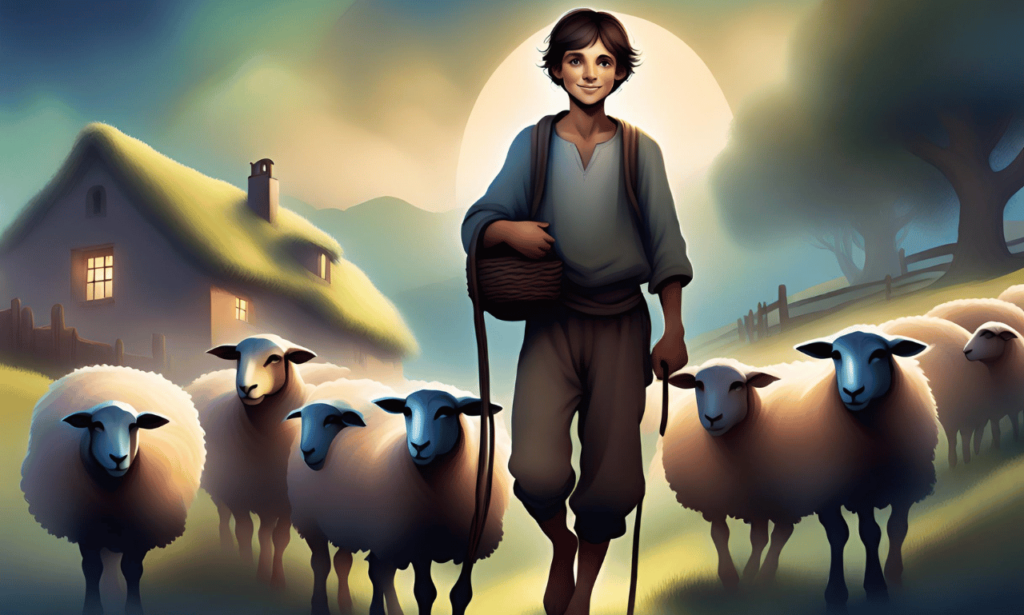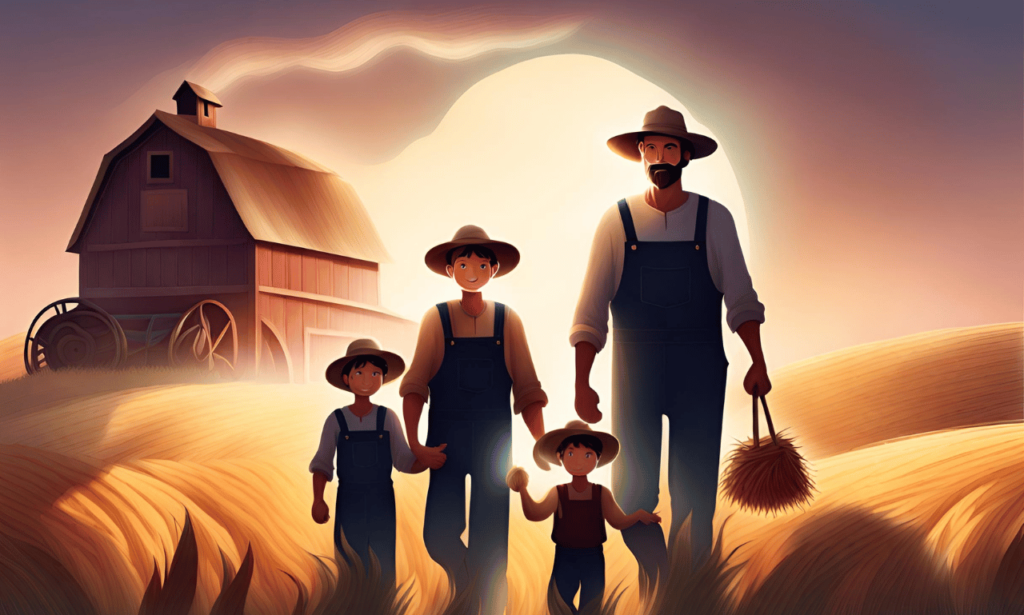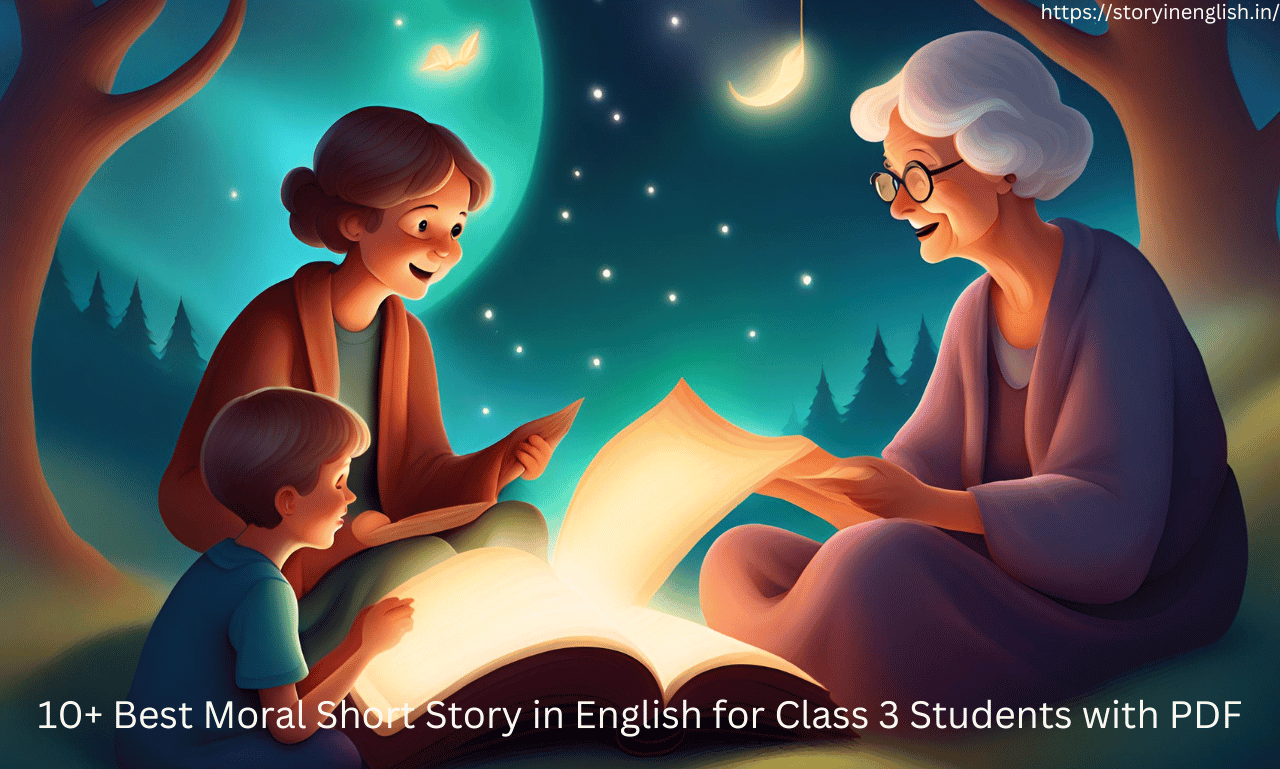Looking for some Best Moral Short story in English for class 3? You are in the right place . Welcome to our blog post on short moral stories tailored for Class 3 students! Stories have always held a special place in the hearts of children, sparking their imagination and teaching valuable lessons along the way. For Class 3 students, storytelling goes beyond mere entertainment; it’s a powerful tool for character development, moral understanding, and nurturing empathy. Through these stories, children learn to distinguish between right and wrong, empathize with others, and internalize important values that shape their growth. Join us as we delve into a collection of captivating tales that inspire, educate, and ignite the imagination of young minds.
10+ Best Moral Short story in English for class 3 with PDF
Calling all young story explorers! Embark on a journey through enchanting tales packed with valuable lessons! Discovering the best moral short story in English for Class 3 students is an enriching journey that combines entertainment with valuable life lessons. In this blog post, we’ll explore captivating tales that not only entertain but also in still important values, making learning a delightful adventure for young minds.
To Download this article as a PDF, Click Hare
Story1: The Lion and the Mouse: Short Story in English for Class 3 Students
Once upon a time, in a lush green forest, there lived a mighty lion. He was the king of all the animals in the forest and was feared by many because of his strength and power. One day, while the lion was taking a nap under a shady tree, a tiny mouse accidentally ran over his paw. The lion woke up with a start and caught the mouse with his huge paw.

“Please, Mr. Lion, spare my life! I’m just a small mouse; I mean you no harm,” squeaked the mouse, trembling with fear.
The lion smirked and replied, “How dare you disturb my rest? I should eat you right away!”
But the mouse pleaded earnestly, “Oh, the mighty lion, please show mercy! Someday, I might be able to help you too.”
The lion, amused by the mouse’s audacity, decided to let it go. Sometime later, the lion found himself trapped in a hunter’s net. Roaring in distress, he struggled to break free, but it was useless. Hearing the lion’s cries, the little mouse rushed to the scene. Its sharp teeth gnawed through the net’s ropes, setting the lion free.
The lion was astonished and grateful. From that day on, he realized that even the smallest creatures can be of great help. He befriended the mouse and promised to protect it forever.
Moral: Kindness is never wasted.
Explanation: This moral teaches us that showing kindness and mercy towards others, regardless of their size or stature, is always valuable. As the lion spared the tiny mouse, who later saved him in return, we should treat everyone with kindness and respect. In everyday life, this moral can be applied by being compassionate towards others, helping those in need, and understanding that small acts of kindness can make a big difference. Whether helping a friend in trouble, being polite to someone who needs it, or simply sharing a smile, every act of kindness creates positivity in the world.
Short Story in English for Class 3
Story2: The Ant and the Grasshopper: Short Story in English for Class 3 Students

A diligent ant and a carefree grasshopper lived in a cozy little meadow. While the ant spent its days gathering food for the winter, the grasshopper hopped around, enjoying the warmth of the sun and singing songs all day long.
One sunny day, the grasshopper saw the ant scurrying about, collecting and storing grains in its tiny home. “Why do you work so hard, dear ant?” asked the grasshopper, puzzled by the ant’s busyness.
The ant replied, “I work hard now, so I’ll have enough food to eat when winter comes. You should do the same, dear grasshopper.”
But the grasshopper just laughed and continued to frolic in the meadow, thinking there was plenty of time before winter arrived.
As the days passed and the weather grew colder, the grasshopper found itself hungry and cold. It went to the ant’s home, hoping for some food and shelter.
“Please, kind ant, I’m so hungry and cold. Will you share some of your food with me?” pleaded the grasshopper, feeling regretful for not listening to the ant’s advice.
Although disappointed by the grasshopper’s lack of preparation, the ant took pity on its friend. It shared some of its food and allowed the grasshopper to stay with it through the winter.
Moral: Hard work and planning lead to success.
Explanation: This moral teaches us the importance of responsibility and planning for the future. Just like the ant who worked diligently to prepare for the winter, we should strive to set goals, work hard, and make wise decisions to achieve success in life. This moral can be applied in everyday life by cultivating good habits such as saving money, studying regularly, and setting achievable goals. By being proactive and planning for the future, we can overcome challenges and enjoy the fruits of our labour when the time comes.
Short Story in English for Class 3
Story3: The Boy Who Cried Wolf: Short Story in English for Class 3 Students
Once upon a time, a mischievous young boy named Jack lived in a quaint little village nestled between rolling hills and lush green fields. Jack was a shepherd boy who tended to his flock of sheep every day. One sunny afternoon, while watching over the sheep, he suddenly got bored and thought playing a prank on the villagers would be fun.

Running down the hill towards the village, Jack cried at the top of his lungs, “Wolf! Wolf! The wolf is coming to eat our sheep!”
Hearing his cries, the villagers dropped everything and rushed to the fields with sticks and stones, ready to fend off the wolf and protect the sheep. But when they arrived, they found Jack laughing hysterically, admitting that it was just a joke.
The villagers were annoyed by Jack’s prank but let it slide, warning him not to cry wolf again. However, Jack didn’t learn his lesson. A few days later, feeling bored again, he decided to play the same prank again. This time, the villagers hesitated to believe him, thinking it was just another of Jack’s tricks. Ignoring his cries for help, they stayed in the village, and the wolf attacked the flock, scattering the sheep.
Moral: Honesty is important, and credibility is earned.
Explanation: This story teaches us the importance of honesty and credibility. People stop trusting us when we constantly lie or deceive others, as Jack did by crying wolf when there was no danger. Being honest and truthful in everyday life builds trust and credibility with others. Whether it’s keeping promises, admitting mistakes, or speaking the truth even when difficult, honesty forms the foundation of strong relationships and builds a reputation for reliability. Just as the villagers learned not to believe Jack’s cries for help, others may not believe us if we’re not truthful and trustworthy. Therefore, we must value honesty and uphold our credibility in all situations.
Short Story in English for Class 3
Story4: The Tortoise and the Hare: Short Story in English for Class 3 students
Once upon a time, a tortoise and a hare lived in a forest not far away. The hare was very proud of his speed, always boasting about how fast he could run. The tortoise, on the other hand, was slow but steady.
One sunny day, the hare challenged the tortoise to a race. Laughing at the idea of racing such a slow creature, the hare agreed to the race. The animals of the forest gathered around to watch.

As the race began, the hare dashed ahead, leaving the tortoise far behind. Confident of his victory, the hare decided to take a nap under a tree. Meanwhile, the tortoise kept plodding along, one step at a time.
When the hare woke up, he saw the tortoise nearing the finish line. With a burst of speed, he raced towards the end. But it was too late. The tortoise had already crossed the finish line, winning the race.
Moral: “Slow and steady wins the race.”
Explanation: This moral teaches us that it’s not always the fastest who succeeds. We can achieve our goals by being patient, persistent, and consistent in our efforts. Like the tortoise, we should focus on our journey and not be distracted by others. This moral can be applied in everyday life by encouraging children to work steadily towards their goals, even if progress seems slow. It teaches them the value of perseverance, determination, and resilience, essential qualities for success in any endeavour.
Short Story in English for Class 3
Story5: The Thirsty Crow: Short Story in English for Class 3 students
Once upon a time, in a sunny meadow, there lived a thirsty crow. It had been flying for hours and was desperately in need of water. Spotting a pitcher nearby, the crow flew down eagerly, hoping to quench its thirst. But to its dismay, the water level in the pitcher was too low, and the crow couldn’t reach it with its beak.

Feeling hopeless, the crow thought for a moment. Suddenly, an idea struck its clever mind. It began picking up small pebbles with its beak and dropping them into the pitcher, one by one. With each pebble, the water level in the pitcher rose a little higher.
After dropping several pebbles, the crow rejoiced as the water finally reached the top. It happily drank to its heart’s content, feeling grateful for its ingenuity.
Moral: Creativity and perseverance can overcome obstacles.
Explanation: This moral teaches us that thinking creatively and persevering can help us find solutions when faced with challenges. In everyday life, we encounter obstacles and problems that may initially seem impossible. However, by staying determined and thinking outside the box, we can overcome these obstacles and achieve our goals.
For example, if we’re struggling with a difficult homework assignment, instead of giving up, we can brainstorm different ways to approach the problem. We can ask for help from friends or teachers, break the task into smaller, more manageable parts, or try different study techniques until we find what works best.
Similarly, we can use our creativity to find alternative solutions in situations where resources are limited, like the crow with the pitcher. Whether finding a workaround for a shortage of supplies or adapting to unexpected changes, thinking creatively and persevering in the face of adversity can lead to success. By applying this moral in our everyday lives, we can develop resilience, problem-solving skills, and a positive attitude towards challenges.
Short Story in English for Class 3
Story6: The Fox and the Grapes: Short Story in English for Class 3 students
Once upon a time, in a lush orchard, there lived a hungry fox. One hot summer day, as the sun beat down relentlessly, the fox spotted a beautiful bunch of ripe grapes hanging from a vine. Its mouth watered at the sight of the juicy grapes, and it licked its lips in anticipation.

The fox jumped and leaped, trying to reach the grapes, but they were just out of its reach. No matter how hard it tried, the grapes remained tantalizingly high above the ground. After many failed attempts, the fox finally gave up, panting and exhausted.
Feeling frustrated and disappointed, the fox walked away, muttering to itself, “Those grapes are probably sour anyway. I didn’t want them anyway.”
Moral: Sometimes, we pretend to despise what we cannot have.
Explanation: This moral teaches us about the human tendency to rationalize and downplay the value of things we desire but cannot attain. In everyday life, we often encounter situations where we face disappointment or frustration because we cannot achieve something we desire, whether it’s a goal, possession, or opportunity.
For example, if we don’t get the toy we wanted or the top score in a game, we might convince ourselves that we never really wanted it in the first place or that it’s not as good as we initially thought. This defence mechanism helps us cope with failure or rejection by protecting our ego and self-esteem.
However, it’s important to recognize and acknowledge our true feelings instead of pretending to be indifferent or dismissive. By being honest with ourselves, we can learn to deal with disappointment healthily, accept our limitations, and work towards finding alternative solutions or pursuing new goals. Additionally, practicing gratitude for what we do have can help shift our focus from what we lack to what we appreciate, fostering a positive mindset and greater contentment in life.
Short Story in English for Class 3
Story7: The Goose That Laid the Golden Eggs: Short Story in English for Class 3 students

Once upon a time, a poor farmer named Jack lived in a quaint little village. Jack had a small but cozy farmhouse where he lived with his wife, Emily. Every day, Jack worked hard in his fields, but no matter how much he toiled, he could never earn enough to make ends meet.
One day, while tending to his farm, Jack stumbled upon a remarkable discovery. He found a beautiful goose that laid golden eggs! Jack couldn’t believe his luck and hurried home to show Emily. From that day on, the goose laid a shiny golden egg every morning, bringing wealth and prosperity to Jack and Emily’s household.
Excited by their newfound fortune, Jack and Emily became greedy. They started dreaming of even greater riches and wondered if there was a way to get more golden eggs faster. They cut open the goose, thinking it must be filled with gold inside.
To their dismay, when they opened the goose, they found nothing but feathers and innards. They had killed the goose that laid the golden eggs in their greed for more.
Moral: Greed leads to loss.
Explanation: This moral teaches us that greed can cloud our judgment and lead to negative consequences. In everyday life, it’s important to be content with what we have and not let greed drive our actions. Instead of constantly chasing after more wealth, possessions, or success, we should learn to appreciate and be grateful for our blessings.
By practicing gratitude and contentment, we can cultivate a sense of fulfilment and happiness. Moreover, we should be mindful of the consequences of our actions and avoid making impulsive decisions driven by greed or selfish desires. Instead, we should focus on making ethical choices that prioritize the well-being of ourselves and others. By applying this moral in our everyday lives, we can lead more fulfilling and balanced lives, free from the negative consequences of greed.
Short Story in English for Class 3
Story8: The Greedy Dog: Short Story in English for Class 3 students
Once upon a time, in a bustling village, there lived a greedy dog. The dog was always hungry and constantly on the lookout for food. One day, while wandering through the village, it came across a butcher’s shop with a juicy bone displayed in the window.
The greedy dog’s mouth watered at the sight of the bone, and it couldn’t resist the temptation. With a quick snatch, the dog grabbed the bone and ran away to enjoy its treasure in peace.

As the dog trotted home, crossing a bridge over a river, it glanced down and saw its reflection in the water. Mistaking its own reflection for another dog with an even bigger bone, the greedy dog growled and barked, demanding the other dog to give up its bone.
But to its dismay, as it opened its mouth to bark, the bone slipped from its jaws and fell into the river below. The greedy dog watched helplessly as the bone sank to the bottom of the river, lost forever.
Feeling foolish and disappointed, the dog realized its mistake. It had been so consumed by greed that it had lost the bone it already had.
Moral: Contentment brings happiness, greed leads to loss.
Explanation: This moral teaches us the importance of being content with what we have and not being greedy for more. In everyday life, it’s easy to get caught up in wanting more possessions, more money, or more success. However, constantly chasing after these desires can lead to dissatisfaction and disappointment.
Instead, by practicing contentment and gratitude for what we already have, we can find true happiness and fulfilment. We can focus on appreciating the simple joys in life, cherishing our relationships, and being grateful for the blessings that surround us.
Furthermore, this story reminds us to be cautious of the consequences of greed. When we let greed cloud our judgment, we may make hasty decisions or act selfishly, ultimately leading to loss or harm. By cultivating contentment and moderation in our lives, we can avoid the pitfalls of greed and live more fulfilling and meaningful lives
Short Story in English for Class 3
Story9: The Farmer and His Sons: Short Story in English for Class 3 students

In a quaint village nestled among rolling hills, there lived a wise old farmer and his three sons. The farmer had worked hard all his life, tilling the land and tending to his crops. As he grew older, he began to worry about the future and the legacy he would leave behind.
One day, the farmer called his sons together and handed each of them a single stick. “Break it,” he instructed them. The eldest son, eager to impress his father, grabbed the stick and tried to snap it in half, but it remained unbroken. The second son tried next, but to no avail. Finally, it was the youngest son’s turn. Instead of attempting to break the stick, he carefully examined it and then bent it gently until it snapped easily.
Pleased with his youngest son’s ingenuity, the farmer smiled and said, “My dear sons, just as the single stick was strong when united, so too are we stronger together as a family. If you stand united and support one another, you can overcome any obstacle that comes your way.”
The sons nodded in understanding, realizing the wisdom behind their father’s words. From that day on, they worked together as a team, helping each other through the challenges of farming and life.
Moral: Unity is strength.
Explanation: This moral teaches us the importance of standing together and supporting one another. In everyday life, we encounter various challenges and obstacles that can be daunting to face alone. However, when we come together with our family, friends, or community, we can draw strength from each other and overcome adversity more easily.
For example, in a family, unity can mean showing love and understanding towards each other, being there for one another in times of need, and working together to achieve common goals. In a community, unity can involve collaborating on projects, supporting local initiatives, and fostering a sense of belonging and inclusivity.
By embracing the value of unity in our lives, we can build stronger relationships, create a sense of solidarity within our communities, and tackle challenges with resilience and determination. Together, we can achieve more than we ever could alone.
Short Story in English for Class 3
Story10: The Boy Who Sold Wisdom: Short Story in English for Class 3 students
In a small village nestled among rolling hills, there lived a young boy named Sam. Sam was known throughout the village for his wisdom beyond his years. He had a kind heart and was always willing to help others with his sage advice.

One day, a traveling merchant passed through the village, selling various goods and trinkets. Intrigued by the boy’s reputation for wisdom, the merchant approached Sam and proposed a deal.
“I have heard of your wisdom, young lad,” said the merchant. “I will offer you a bag of gold coins in exchange for your wisdom.”
Sam was tempted by the offer of riches, but he hesitated. He knew that his wisdom was valuable and should not be sold for material gain. After pondering for a moment, he politely declined the merchant’s offer.
Instead, Sam offered the merchant a piece of advice for free. “True wisdom cannot be bought or sold,” he said. “It comes from within and is meant to be shared with others.”
The merchant was impressed by Sam’s wisdom and thanked him for his insight. As he continued on his journey, he realized the true value of the boy’s words.
Moral: True wisdom cannot be bought or sold; it comes from within and is meant to be shared with others.
Explanation: This moral teaches us the importance of valuing wisdom and sharing it with others selflessly. In everyday life, we encounter situations where we may be tempted to prioritize material gain over the things that truly matter, such as knowledge, understanding, and compassion.
By recognizing that true wisdom cannot be bought or sold, we can focus on cultivating our inner wisdom through learning, reflection, and life experiences. We can also strive to share our wisdom with others generously, helping them navigate life’s challenges and make wise decisions.
Furthermore, this story reminds us to prioritize values such as integrity, humility, and generosity over the pursuit of wealth or status. By embracing these virtues, we can lead more meaningful and fulfilling lives, enriching not only ourselves but also the lives of those around us.
Short Story in English for Class 3
Conclusion:
In conclusion, short stories in English for Class 3 students serve as invaluable tools for moral education and character development. Through captivating narratives like “The Lion and the Mouse,” “The Ant and the Grasshopper,” “The Thirsty Crow,” “The Greedy Dog,” and “The Boy Who Sold Wisdom,” children not only immerse themselves in engaging tales but also absorb important life lessons effortlessly.
For parents and educators seeking to enhance moral education in Class 3 students, integrating these short stories into curriculum plans and extracurricular activities can yield significant benefits. By leveraging the power of storytelling, educators can create immersive learning experiences that resonate deeply with young minds, fostering empathy, resilience, and ethical decision-making skills.
In essence, short stories in English for Class 3 students enrich learning experiences and lay the foundation for lifelong moral growth and development. Let us continue to harness the power of storytelling to inspire and educate the next generation, creating a brighter future for all.
Also Read: 10+ New Moral Story in English for Class 1 | Best for Shaping a Child’s Character
Also Read: 7+ Best Moral Stories for Kids in English for Competition (New Stories)
Also Read: 10 New & Best Moral Story for Class 2 in English

[…] Also Read: 10+ Best Moral Short Story in English for Class 3 Students with PDF […]